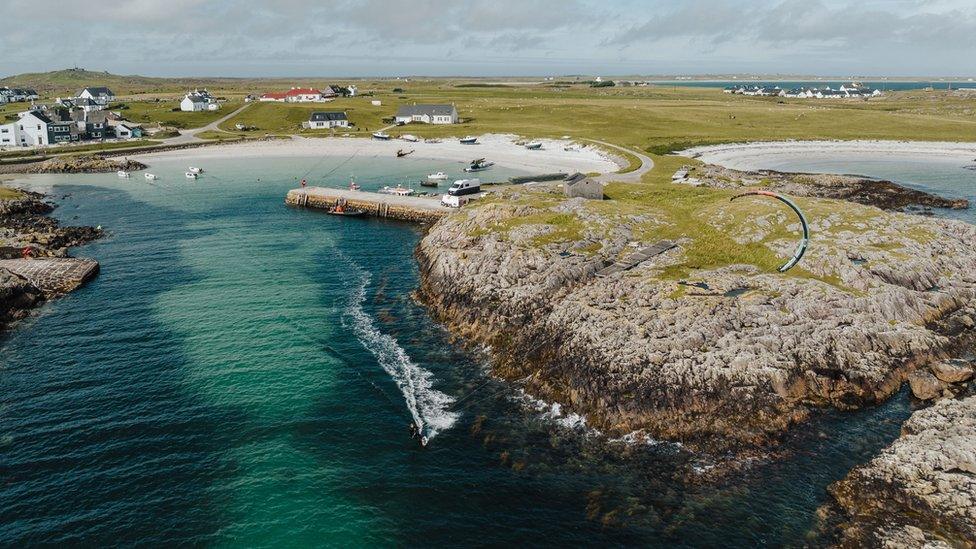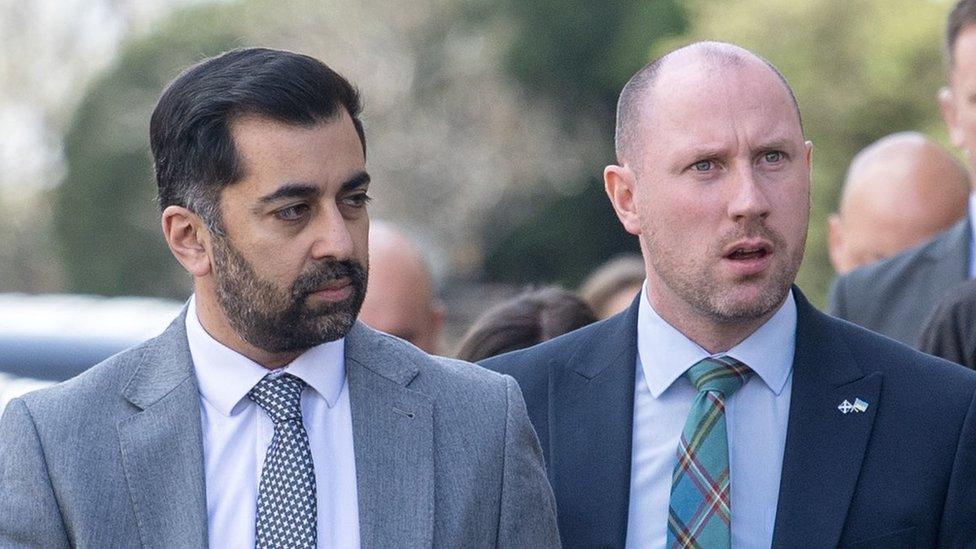Scotland's New Deal business group gets under way
- Published

The deposit return scheme and plans to ban alcohol advertising are top concerns for businesses hoping to be heard
A 'new deal' between business and the Scottish government gets under way today, after years of deteriorating relations and a long list of business gripes.
Without more money available, it's likely to be focussed on getting a mutual understanding at first, and trying to identify shared goals.
As co-chair for the business side, Poonam Malik says business has to acknowledge that government has reasonable requirements for change, ranging from fairer work practices to working together on cutting carbon emissions.
Deal-making: one of the skills business and politics have in common. But when the two sides eyeball each other in Edinburgh today, do they have the same understanding of the deal they're trying to reach?
At Holyrood, there's been a reshuffle of the SNP ministerial pack, and the New Deal promised by a new first minister comes with an agenda for a different type of economy, emphasising wellbeing and fairness.
On the business side, they have a different agenda, and at the top of it is the imposition of regulation without thought or apparent care about the practicalities and cost.
They saw the leadership election that brought Humza Yousaf to Bute House as a welcome opportunity to get a hearing for their concerns. The New Deal for Business was one outcome, and others may flow from it.
Those concerns featured the deposit return scheme (DRS) for bottles, now paused, and on the plans to ban alcohol advertising, now in the long grass and unlikely to avoid major change.
Those were the most vocal business lobbies through the campaign weeks. Candidates were also getting an ear-bashing about Highly Protected Marine Areas (HPMAs) and their potential impact on anyone making their money from the sea: business rates skewed against those trying to keep shopping streets alive: a rent freeze and eviction ban which dumped costs on private landlords who provide more than 15% of Scottish housing.

Islanders in Tiree were among those opposed to HPMAs
And there's more to come, with land reform, controls on unhealthy food marketing and further low emission zones in cities, amid a raft of decarbonising, climate change measures required to hit stretching targets to reach net zero emissions. Tourism faces bed taxes and regulation of short-term lets.
Meanwhile, measures enacted at Westminster have deprived businesses of the foreign recruits they need and easy trading links with Europe, with uncertainty about a rush to rip up European regulations which may now be slowing up.
Industrial policy in the US and EU, bringing subsidy to green industries, is sucking the investment out of the UK at least until Downing Street decides how to respond.
There's been political instability. And then there's inflation and higher interest rates, hitting most businesses in many of the same ways it has walloped households.
Transformation
The conventional view of business is that government should get out of its way and let it create jobs and grow prosperity. The pandemic has altered that view. Furlough cash and business loans sent a message about both government and society, and business was reminded it depends on both.
At Holyrood, there is a limit to what can be achieved in three or four meetings before the new forum provides a report for the first minister.
The New Deal group then splits into sub-groups, which could take 12 to 18 months to report back.

The group, co-chaired by Wellbeing Economy Secretary Neil Gray (right), will report to Humza Yousaf after three or four meetings
Sceptics point to the numerous attempts to reshape relations before. It seems like only last year that Kate Forbes was setting out a ten-year National Strategy for Economic Transformation. That's because it was last year.
Alex Salmond made a bold start in 2007, befriending big business on the campaign trail and going for growth.
Nicola Sturgeon's instincts were to focus instead on public services and inequality, and business found it hard to get a hearing, or at least one that seemed to get any results. Her deal with Scottish Green MSPs introduced ministers whose priority for business was to regulate it more and to reshape the economy.
Humza Yousaf's campaign rhetoric was similar, with his emphasis on putting wellbeing into growth. As first minister, early signals suggest he's rowing back on that, to win back trust and a working relationship with business.
Intent is key
The co-chair of the New Deal forum, Poonam Malik, believes 'wellbeing' brings a lot of different definitions to the table.
The initial meeting is likely to be a search for a common understanding of what each side is trying to achieve, gauging each other's expectations of direction and speed, with compromise likely to be required on both sides.
She is a very busy woman - a technology entrepreneur, now at Strathclyde University leading its tech spin-outs and investments, a business coach and strategist, and a serial joiner of public sector boards, including Scottish Enterprise, Skills Development Scotland and the University of the Highlands and Islands.
With degrees from India, Edinburgh and Glasgow, she's an adopted Fifer.

Dr Poonam Malik is head of investments at the University of Strathclyde
Her view is that the change required in the business-government relationship requires business to be more involved at an early stage in discussing with government what it intends to do.
An understanding of each other is that both sides are tightly constrained in the resource they've got at their disposal. The outcome of this process cannot be an expensive one.
It can, however, lead to reallocated resource to meet new needs - for instance in skills training, where there has been a sharp shift towards the need for skills in the green and digital sectors, including artificial intelligence and data.
Outcomes are more likely to involve measures to make Scotland a more attractive place to invest, with an understanding of the role of making profit. There's expertise built up over the years in Scottish Enterprise, which could be better deployed, argues Dr Malik.
In return, government has an interest in harnessing business to re-shape society, through gender balance, inclusive workplace policies, with fair wage and employment practices.
It can't get close to its net zero targets if business is not aligned with them. That can be through regulation, but it may work better if it is through persuasion and appealing to business's self-interest.
Dr Malik doesn't expect quick, concrete outcomes from this process. She foresees a setting out of principles and a shared agenda on what can be achieved, addressing both sides' wish lists. From shared goals, the two sides can shape the means of getting there.
The key, for now, is to have the intent to improve that relationship and address each other's needs. Without that intent, it won't get far. And another business forum will be set up before long.
Related topics
- Published15 May 2023

